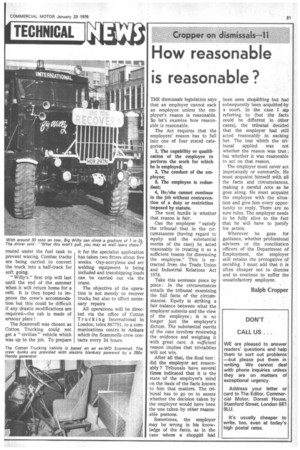topper on dismissals How reasonable
Page 23

If you've noticed an error in this article please click here to report it so we can fix it.
is reasonable?
THE dismissals legislation says that an employer cannot sack an employee unless the employer's reason is reasonable. So let's examine how reasonable is reasonable.
The Act requires that the employers' reason has to fall into one of four stated categories: 1, The capability or qualification of the employee to perform the work for which he is employed; 2, The conduct of the employee; 3, The employee is redundant; 4, He/she cannot continue In the job without contravention of a duty or restriction imposed by statute.
The next hurdle is whether that reason is fair.
Can the employer "satisfy the tribunal that in the circumstances (having regard to equity and the substantial merits of the case) he acted reasonably in treating it as a sufficient reason for dismissing the employee." This is extracted from the Trade Union and Industrial Relations Act 1974.
Take this sentence piece by piece: In the circumstances entails the tribunal examining the full facts of the circumstances. Equity is striking a fair balance between what the employer submits and the view of the employee ; it is no longer just the employer's dictum. The substantial merits of the case involves reviewing the evidence and weighing it with great care. A sufficient reason implies that trivialities will not win.
After all that, the final test: did the employer act reasonably? Tribunals have several times indicated that it is the state of the employer's mind on the basis of the facts known to him that matters. The tribunal has to go on to assess whether the decision taken by the employer would have been the one taken by other 'reasonable persons.
Sometimes, the employer may be wrong in his knowledge of the facts, as in the case whene a shopgirl had been seen shoplifting 'but had subsequently been acquitted by a court. In the case I acp referring to (but the facts could be different in other cases), the tribunal decided that the employer had still acted reasonably in sacking her. The test which the tribunal applied was not whether the reason was true ; but whether it was reasonable to act on that reason.
The employer must never act impetuously or summarily. He must acquaint himself with all the facts and circumstances, making a careful note as he goes along, He must acquaint the employee with the situation and give 'him every opportunity to reply. There are no sure rules. The employer needs to be fully alive to the fact that he will have to justify his action.
Wherever he goes for guidance, whether professional advisers or the conciliation officers of the Department of Employment, the employer still retains the prerogative of deciding. I must add that it is often cheaper not to dismiss and to continue to suffer the unsatisfactory employee.
Ralph Cropper
















































































